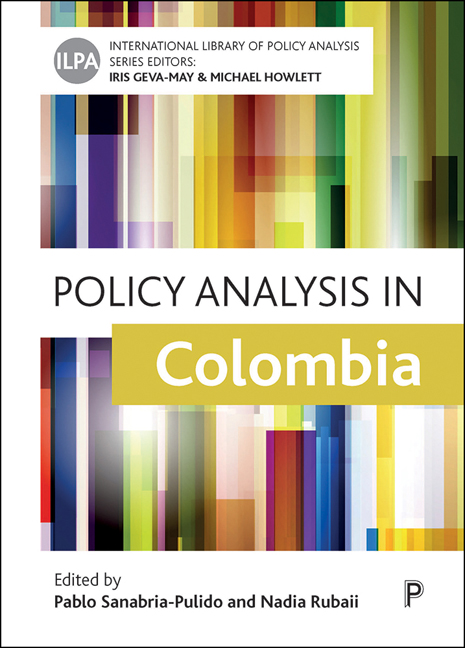Book contents
- Frontmatter
- Dedication
- Contents
- List of Figures and Tables
- List of Abbreviations
- Notes on Contributors
- Editors’ Introduction to the Series
- Policy Analysis in Colombia: An Introduction
- Part One Policy Analysis in Contemporary Colombia
- One The policy Analysis Movement in Colombia: The State of the Art
- Two Evolution of Policy Analysis as a Field of Study and Instruction in Colombia
- Three Policy Analysis, Bureaucratic Capacity and Public Administration Reforms in Colombia
- Part Two Policy Analysis within National and Subnational Governments
- Four Policy Analysis Inside Central Government in Colombia
- Five Policy Analysis and the Legislature in Colombia
- Six Policy Analysis in the Colombian Constitutional Court
- Seven Metropolitan Governance and Policy Analysis in Colombia
- Eight Policy Analysis for Decision Making in Colombian Local Governments
- Part Three Policy Analysis in Key Policy Domains
- Nine Policy Analysis in the Education Sector in Colombia
- Ten Policy Analysis in the Health Sector in Colombia
- Eleven Policy Analysis and Decision Making in the Military Forces: The Havana Experience
- Twelve Technocracy, Decision Making and Economic Policy in Colombia
- Thirteen Social Policy, Target Populations and Policy Analysis in Colombia
- Part Four Policy Analysis Beyond the State
- Fourteen Political Parties and Policy Analysis in Colombia
- Fifteen Policy Analysis and NGOs in Colombia
- Sixteen Media, Evidence and Policy Analysis in Colombia
- Conclusion: Building Capacity for Policy Analysis Amid Tensions and Challenges in Colombia
- Index
Five - Policy Analysis and the Legislature in Colombia
Published online by Cambridge University Press: 10 March 2021
- Frontmatter
- Dedication
- Contents
- List of Figures and Tables
- List of Abbreviations
- Notes on Contributors
- Editors’ Introduction to the Series
- Policy Analysis in Colombia: An Introduction
- Part One Policy Analysis in Contemporary Colombia
- One The policy Analysis Movement in Colombia: The State of the Art
- Two Evolution of Policy Analysis as a Field of Study and Instruction in Colombia
- Three Policy Analysis, Bureaucratic Capacity and Public Administration Reforms in Colombia
- Part Two Policy Analysis within National and Subnational Governments
- Four Policy Analysis Inside Central Government in Colombia
- Five Policy Analysis and the Legislature in Colombia
- Six Policy Analysis in the Colombian Constitutional Court
- Seven Metropolitan Governance and Policy Analysis in Colombia
- Eight Policy Analysis for Decision Making in Colombian Local Governments
- Part Three Policy Analysis in Key Policy Domains
- Nine Policy Analysis in the Education Sector in Colombia
- Ten Policy Analysis in the Health Sector in Colombia
- Eleven Policy Analysis and Decision Making in the Military Forces: The Havana Experience
- Twelve Technocracy, Decision Making and Economic Policy in Colombia
- Thirteen Social Policy, Target Populations and Policy Analysis in Colombia
- Part Four Policy Analysis Beyond the State
- Fourteen Political Parties and Policy Analysis in Colombia
- Fifteen Policy Analysis and NGOs in Colombia
- Sixteen Media, Evidence and Policy Analysis in Colombia
- Conclusion: Building Capacity for Policy Analysis Amid Tensions and Challenges in Colombia
- Index
Summary
Introduction
Despite the existence of formal working majorities in the legislature, Colombian presidents have struggled to fulfill their promises, as Congress waters down reforms, making it the job of the executive to constantly negotiate and find a middle ground between national and local constituency representation. This has been a constant during most of our republican history, characterized by a non-stop electoral cycle (Posada-Carbó, 2000), a highly fragmented and regionalized party system (González, 2014), and a highly centralized executive holding the agenda power.
This chapter summarizes some of the previous findings of the research conducted on the role of Congress in the contemporary policy-making process. With data for more than five presidential periods, we show that Congress has played an important part in reacting to executive bills, protecting constituency interests, leading public debates, and occasionally affecting the agenda impeding governmental action. The main insights of the chapter will cover the period after the 1991 Constitution, analyzing mostly the legislative output of Congress.
Following the basic framework of Haggard and McCubbins (2001), the chapter is divided into five sections. First, we describe the rules establishing the “separation of powers”. This is followed by a discussion of the nature of the party system determining the “separation of purpose” among the branches and the legislative output. Thus, the first section describes the most significant institutions constraining the formal agenda-setting powers in the legislature. We put particular emphasis on the committee system for its veto power. The second section reviews the recent changes of the electoral reforms on the party system, which leads us into the third section analyzing the patterns of legislative activity (coalition parties’ ability to control the legislative agenda) and the scope of the bills based on the incentives of legislators and the executive. Because we know that not all bills are equal, the fourth section discusses what happens when any of the actors tries to avoid the legislature. First, we discuss the role the legislature played in the bills introduced by the government after the failure to pass via plebiscite the historic peace agreement with the FARC-EP, after 50 years of intense civil conflict. Then, we discuss the fate of the anti-corruption agreement (a group of bills) after the “consulta anticorrupción” failed to be approved by 1% of the vote. The last section presents some closing remarks.
- Type
- Chapter
- Information
- Policy Analysis in Colombia , pp. 81 - 98Publisher: Bristol University PressPrint publication year: 2020



